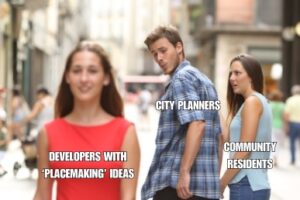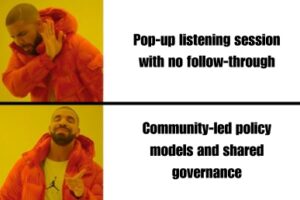There’s a specific kind of grief that comes with watching your community change around you. Not the kind that comes with time or growth—but the kind that quietly erases. Stores close. Neighbors move. Familiar places are renamed, re-zoned, and redesigned for someone else.
This isn’t organic change—it’s engineered displacement.
This spring, we focused on cultural placekeeping: the radical act of protecting not just buildings, but memory, meaning, and identity. It’s not nostalgia. It’s survival. And it’s deeply political.
Because when “revitalization” shows up, it often signals that the people who shaped a place are no longer the intended audience.
We’ve seen it before. The symbols stay, but the people disappear.
Celebrating a neighborhood’s culture means nothing if the people who built it can’t afford to stay.
Culture has always been more than identity—it’s been infrastructure. It has carried communities through colonization, forced migration, disinvestment, and displacement.
It is how we remember, how we organize, how we heal.
But what we’ve seen—over and over—is this: When culture is extracted and divorced from the people who live it, it becomes a costume. It’s marketed. Monetized. Stripped of context and sold to the masses.
What sustained us gets repackaged to attract investors.
And the same systems that once tried to erase us now profit off our existence.
That’s why cultural placekeeping is radical. But on its own, it shouldn’t have to carry the weight of structural change.
Because when preservation isn’t matched with protection—what gets celebrated still gets displaced.
This is the truth Just Communities has always centered: justice isn’t one issue—it’s the system that holds all of them. If we’re not addressing racial inequity, environmental violence, stolen opportunity, and systemic isolation together, then we’re not building communities. We’re building exclusion—with better messaging.
That’s why the Just Communities Protocol exists. Not to fix one thing at a time, but to hold the full complexity. It moves through five commitments—belonging, opportunity, mobility, wellbeing, and environment—not as checkboxes, but as conditions that must exist together.
Still, a framework alone doesn’t shift power. That takes collective action—and shared tools.
That’s where the Information Exchange comes in.
This isn’t a download center. It’s not a curated set of resources to inspire action.
It’s a living record of what works, built by community leaders, organizers, planners, and advocates who are doing the real work of just development every day.
Inside, you’ll find:
- Case studies grounded in lived experience.
- Policy models shaped by communities—not consultants.
- Metrics that track what actually matters.
- Planning and governance tools that move beyond engagement into shared power.
This is shared infrastructure. It’s how we stop working in silos. It’s how we move past inspiration and into implementation. Because we don’t need more promises. We need tools that help us build what hasn’t been allowed to exist—yet.


